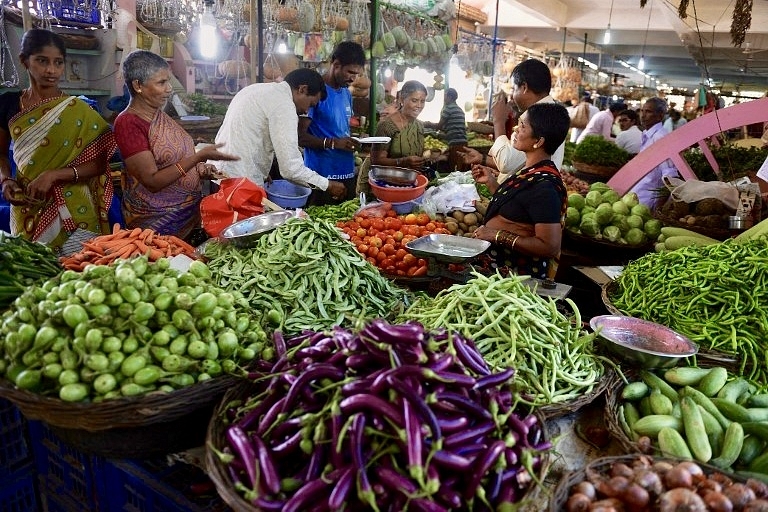Economy
WPI Inflation Turns Negative In May, Here’s What It Means
- The effect of the pandemic has been greater on demand than its impact on supply and as is the case, supply disruptions do tend to get fixed over time.

A vegetable market.
Wholesale Price Index (WPI) has turned negative for the first time in four and a half years and the decline has been sharper than what was anticipated by many analysts, including myself. However, this decline is consistent with what has been anticipated by many over the preceding few months.
Even as many argued that Covid-19 could result in inflation due to supply shortages, it was evident that the impact of the pandemic will be the opposite on prices, that is, prices will fall rather than increase.
This is intuitive as the effect of the pandemic on the demand is far greater than the impact on supply and as is the case, supply disruptions do tend to get fixed over time. The fall in WPI is also due to lower oil prices and power prices.
The negative WPI will definitely have an impact on Consumer Price Index (CPI) which is likely to moderate sharply over the coming few months. This is consistent as we have witnessed nominal wages being cut across the board in the range of 10-40 per cent while many companies have even fired people.
This means there is a permanent income loss that we have witnessed which will have a significant impact on consumer spending for the coming quarters. This means that we shouldn’t expect inflation to be a threat anytime soon.
This implies that one of the two constraints to fiscal spending in the form of inflation is not going to be a problem and that the lack of inflation means lower nominal growth, which means lower revenues from taxes. It is, therefore, important to act in a manner that generates an inflationary impulse in the economy.
The argument is simple, taxes are collected on the value of goods and services, which depends on prices. Lower prices mean lower value and hence lower revenues.
The other thing is on the interest rates front as negative WPI also implies the possibility of further rate cuts over the next monetary policy review. However, we must also keep in mind that the data collection at the moment is not at its finest.
“This department has advised the field offices to collect price data through electronic means of the communication during the lockdown. The response rate for April 2020 has improved substantially. Final index for the month of April 2020 will be released in next month press note in the light of the updated data received from the selected sources," said a statement from Department for Promotion of Industry and Internal Trade (DPIIT).
This is important for policymakers as they attempt to make sense of the present situation. The NSO has in fact not released the headline retail inflation figures. There is another issue with measuring prices at a time when a bulk of economic activity is not at the pre-Covid-19 levels. With most markets operating at lower capacity, prices are likely to be suppressed. However, once economic activity normalises, we can expect things to get back to the pre-Covid-19 levels.
What this essentially implies is that there is little information available with policymakers during the pandemic, especially on inflation. However, with the Reserve Bank of India (RBI) and the Monetary Policy Committee (MPC) taking a pro-growth stance, the lack of reliable data on inflation should not act as a bottleneck for further monetary action. It is important to recognise the importance of inflation, especially for an emerging economy.
As is the case, leading central bankers in advanced economies have been trying to create inflationary impulses as inflation continues to under-shoot their targets.
We should expect the same to be the case in India at least for the next few quarters. This makes us question, how low can our interest rates really go, especially as deposit rates are already below 3 per cent? We are likely to find an answer to this over the coming few months.
Introducing ElectionsHQ + 50 Ground Reports Project
The 2024 elections might seem easy to guess, but there are some important questions that shouldn't be missed.
Do freebies still sway voters? Do people prioritise infrastructure when voting? How will Punjab vote?
The answers to these questions provide great insights into where we, as a country, are headed in the years to come.
Swarajya is starting a project with an aim to do 50 solid ground stories and a smart commentary service on WhatsApp, a one-of-a-kind. We'd love your support during this election season.
Click below to contribute.
Latest